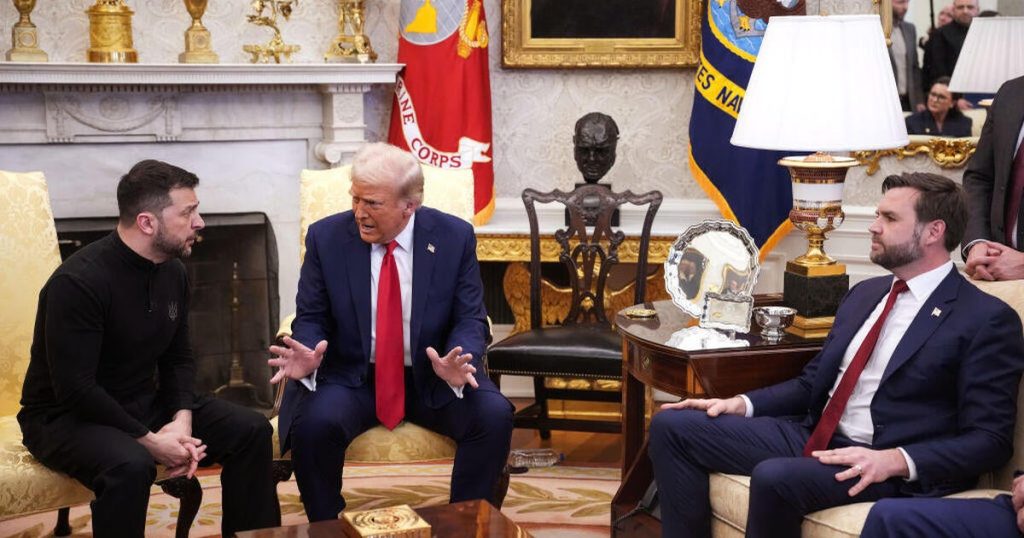In a recent Oval Office meeting, President Trump, Vice President JD Vance, and Ukrainian President Volodymyr Zelenskyy engaged in discussions that raised concerns about the future of U.S. military aid to Ukraine. Initially characterized by light-hearted exchanges, the meeting quickly took a serious turn as questions emerged regarding Zelenskyy’s capability to secure a peace deal and the prospect of halting financial support from the U.S. Amidst rising tensions, the implications of the meeting reverberate through U.S.-Ukraine relations and impact international dynamics as officials scramble to salvage previous agreements.
| Article Subheadings |
|---|
| 1) The Nature of the Oval Office Meeting |
| 2) The Minerals Deal and its Implications |
| 3) U.S. Officials Response to Zelenskyy’s Stance |
| 4) Current State of U.S. Military Aid |
| 5) The Path Forward for U.S.-Ukraine Relations |
The Nature of the Oval Office Meeting
The recent meeting in the Oval Office, which was meant to represent a potential turning point in U.S.-Ukraine relations, began on an amicable note. President Trump and President Zelenskyy exchanged lighthearted banter and participated in a guest book signing, creating an atmosphere seemingly conducive to dialogue. However, underlying tensions soon brought forth serious concerns. Administration officials relayed that while initially positive, the discussions spiraled into debates over Ukraine’s political leadership and security policies, highlighting key frustrations from the U.S. side regarding Ukraine’s requests and demands.
The Minerals Deal and its Implications
At the heart of the meeting lay a significant minerals deal that is poised to reshape economic partnerships between the U.S. and Ukraine. Officials indicated that this deal was not merely an agreement but a stepping-stone towards establishing a resilient working relationship, integrating U.S. assistance in helping Ukraine tap into its mineral wealth, including natural resources like gas, oil, and aluminum. The signing of this deal was anticipated with great enthusiasm; however, Zelenskyy’s insistence on security guarantees in exchange for economic cooperation stymied progress. European leaders placed frantic calls to Washington following the meeting, hoping to avert the breakdown of negotiations surrounding the minerals deal.
U.S. Officials Response to Zelenskyy’s Stance
The U.S. officials’ response to Ukraine’s demands reflected a new layer of skepticism towards Zelenskyy’s leadership. Following the Oval Office meeting, a senior administration figure explicitly communicated to Zelenskyy that any further discussions would likely be counterproductive, emphasizing the erroneous decision-making attributed to the Ukrainian president. Trump officials expressed disillusionment, initially expecting that negotiating with Russian President Vladimir Putin would pose a significant challenge. In a surprising turn, they found the difficulties emanating from Ukraine instead, pointing to Zelenskyy’s unanswered requests and maximalist demands as primary hurdles in securing U.S. support.
Current State of U.S. Military Aid
As the convoluted relationship between the U.S. and Ukraine continues to evolve, the status of military aid remains a critical area of concern. Despite ongoing discussions, U.S. weapons shipments have persisted since January 20, although no new military aid packages have been announced. The Biden administration had initiated commitments for military support, which have continued, albeit with uncertainty surrounding future allocations. Within the confines of military financing, approximately $3.85 billion in drawdown authority exists for weaponry sourced from U.S. stockpiles. Notably, the decision to release such resources lies solely with President Trump, further complicating the dynamics of U.S. assistance to Ukraine.
The Path Forward for U.S.-Ukraine Relations
The way forward for U.S.-Ukraine relations appears fraught with obstacles and uncertainties. To facilitate collaboration, U.S. officials strongly suggest that Zelenskyy articulate a firm willingness to pursue a ceasefire and engage meaningfully in negotiations with Putin. However, the president of Ukraine asserts that any peace discussions must include robust security guarantees — a stance that may hinder ongoing dialogues. The significance of economic relationships looms large as Trump has communicated intentions to establish a stronger economic partnership with Ukraine before discussing security protocols. The upcoming interactions between U.S. and European leaders may play a pivotal role in shaping the future of diplomatic engagements in this complex conflict.
| No. | Key Points |
|---|---|
| 1 | The Oval Office meeting between President Trump and President Zelenskyy highlighted the fragility of U.S.-Ukraine relations. |
| 2 | A significant minerals deal, intended to strengthen U.S.-Ukraine economic ties, faced hurdles due to Ukraine’s demand for security guarantees. |
| 3 | U.S. officials expressed dissatisfaction with Zelenskyy’s leadership and approach in negotiations, casting doubt on future support. |
| 4 | The status of military aid is in a precarious position, pending further agreements and the decision of President Trump. |
| 5 | The path ahead for peace negotiations depends on Zelenskyy’s readiness to cooperate and the establishment of a robust economic partnership. |
Summary
The recent interactions between U.S. officials and Ukrainian leadership underscore a pivotal moment in international relations, with the potential for long-term consequences affecting the trajectory of military aid to Ukraine and broader geopolitical stability. The discussions around the minerals deal, the expectations from both nations, and Zelenskyy’s perceived demands reflect a complex landscape that continues to evolve. As the situation unfolds, the interplay between economic partnerships and security assurances will be crucial in shaping the future for both nations as they navigate a tumultuous political environment.
Frequently Asked Questions
Question: What are the primary concerns regarding U.S. military aid to Ukraine?
The primary concerns stem from the uncertainty following the recent Oval Office meeting, where the likelihood of ongoing support was questioned based on negotiational difficulties and Ukraine’s requests for security guarantees.
Question: What implications does the minerals deal hold for U.S.-Ukraine relations?
The minerals deal is seen as a critical stepping stone for economic collaboration, potentially bolstering Ukraine’s energy sector. However, its viability is under scrutiny due to Ukraine’s insistence on security guarantees in exchange for economic terms.
Question: How can Zelenskyy potentially improve the U.S.-Ukraine relationship?
Zelenskyy can enhance relations by openly expressing a willingness to pursue a ceasefire with Russia and acknowledging the importance of establishing a strong economic partnership with the U.S. before demanding security assurances.


